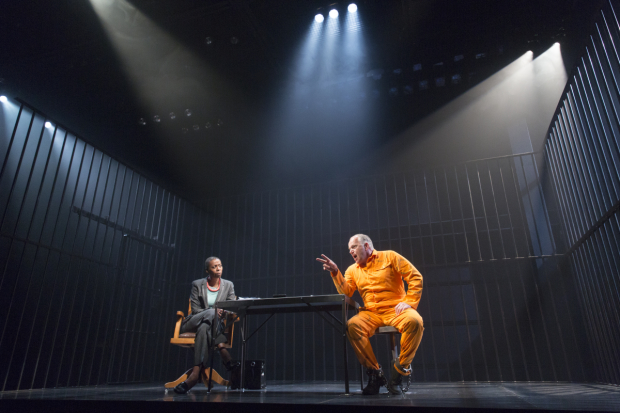A Human Being Died That Night

(© Richard Termine)
Some of the best political theater on earth is currently being written and produced in South Africa. That isn't news to fans of the vaunted South African playwright Athol Fugard (whose excellent The Painted Rocks at Revolver Creek recently premiered in New York), but there are other artists making work of equal quality. Nicholas Wright's A Human Being Died That Night, which is being produced by Eric Abraham and the Fugard Theatre of Cape Town, tackles the radioactive subject of apartheid-era counterinsurgency policeman Eugene de Kock, whose campaign of violence against antiapartheid activists earned him the nickname "Prime Evil." The play is simultaneously astute and emotional, without devolving into sentimentality. That turns out to be an ideal mix for examining a fraught subject like this one.
The play is based on Pumla Gobodo-Madikizela's eponymous book about her encounters with the imprisoned de Kock while she was on South Africa's Truth and Reconciliation Commission. Uncannily portrayed by Noma Dumezweni, Gobodo-Madikizela appears as a character in the show, which mostly takes place within the unsettling confines of the Pretoria jail (imposingly fashioned by Paul Wills) where de Kock is serving two life sentences and an additional 212 years for his crimes. Wearing thick glasses and an orange jumpsuit, the portly de Kock (Matthew Marsh) emerges from his cell to answer Gobodo-Madikizela's questions. Over the next 80 minutes he relives the most terrible moments of South Africa's recent history and his own life.
Director Jonathan Munby manages to conjure a remarkable amount of tension for a play that features two actors chatting from opposite ends of a table. Lighting designer Tim Mitchell stealthily turns up the heat at key moments, darkening the shadows that dominate the space around them. Dumezweni convincingly plays a staid academic attempting to hold back the deluge of her own feelings with the fragile dam of professionalism. It turns out to be not so easy.
Marsh gives a beguiling performance as de Kock, disturbing us with how thoroughly sympathetic we can feel toward a mass murderer. He's garrulous and highly analytical, painfully reckoning with the events that landed him behind bars and conveying a genuine remorse. Through a clipped Afrikaner diction betraying the ghost of a stutter, he tells Gobodo-Madikizela about the terrible atrocities that he committed. All the while, he maintains what Gobodo-Madikizela describes as a "grotesque" concern for Victorian manners, a politeness that verges on ridiculous within the confines of this maximum-security prison.
De Kock's rage only really emerges when he considers the well-to-do white South Africans who benefited from the apartheid system while washing their hands of the ugly business of maintaining it. He angrily rants, "They had no problem, none, so long as they had their nice houses and their second cars and their third cars and their swimming-pools and their kids at good white schools and universities. Which they've hung on to, by the way. Which they've still got." It's all too easy to brand one policeman "prime evil" while ignoring the more insidious ways in which wealthier white South Africans supported a tyrannical government.
That understood, a general consensus has emerged in South Africa (in no small part due to the writing of Gobodo-Madikizela) that de Kock was by no means the most instrumental figure in preserving apartheid. Rather, he has served as a convenient whipping boy for the collective sins of white South Africa. As long as he remained behind bars, they could plausibly claim that the "evil" was contained. Accordingly, he was released on parole in the early months of this year. His whereabouts remain a closely guarded secret. There are many South Africans (black and white) who would like to see him dead.
It should give us pause the next time we consider the problem of excessive force employed by police officers in this country: Is that militarized policing not the natural outgrowth of an exploitative system that demands such methods? With probing plays like A Human Being Died That Night, South Africans are asking such difficult questions about their own young democracy.











